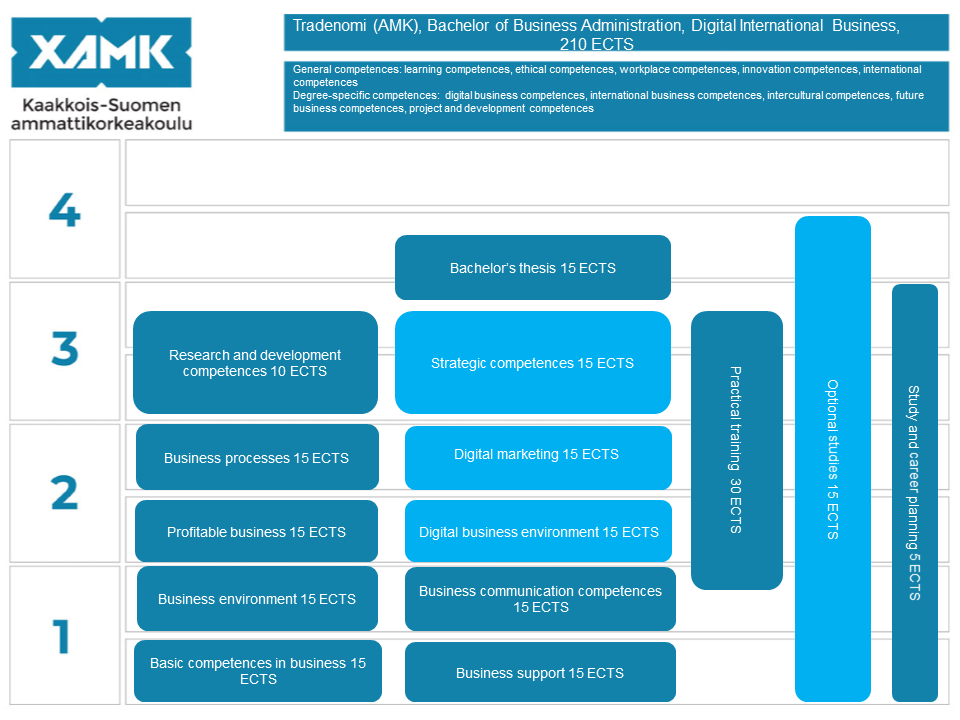Degree Programme in Digital International Business
Koulutuksen sisältö
Täysin englanninkielisen BBA-tutkinnon suorittaminen kestää 3,5 vuotta. Tutkintoaikaa voi lyhentää sinnikkyydellä tai hyväksiluettavilla aiemmilla opinnoilla.
Digital International Business -tutkinnon opintojen rakenne
• ydinosaaminen (150 opintopistettä, op), joka sisältää kaikille tradenomeille keskeiset osaamisalueet, työharjoittelun ja opinnäytetyön
• täydentävä osaaminen (60 op), joka sisältää digitaalisen liiketoiminnan syventävät opinnot (45 op) ja vapaasti valittavat opinnot (15 op).
Suoritettuasi ydinopinnot
• tunnet yrityksen eri toiminnot ja osaat tehdä niihin liittyviä päätöksiä
• osaat analysoida toimintaympäristön muutoksia ja niiden vaikutuksia yrityksen kansainväliseen digitaaliseen toimintaan.
• osaat käyttää tietotekniikkaa päätöksenteon apuvälineenä
• osaat tehdä tutkimuksia ja käyttää niitä liiketoiminnan tukena.
Suoritettuasi täydentävät opinnot
• hallitset digitaalisen markkinoinnin ja myynnin eri prosesseja kansainvälisessä liiketoiminnassa
• tunnet yrityksen eri digitaaliset liiketoimintamallit
• osaat analysoida lohkoketjun ja alustatalouden vaikutuksia yrityksen kehitykseen
• osaat johtaa kansainvälisen yrityksen tuotekehitystä ja innovaatiotoimintaa
• hallitset kansainvälisen liiketoiminnan strategisia ja innovatiivisia prosesseja.
Työelämän kanssa tehtävä yhteistyö on merkittävä osa opintoja. Oppiminen tapahtuu käytännön projekteissa, ja yrittäjämäinen toimintatapa on mukana opetusmenetelmissä ja opintojaksojen sisällöissä. Työelämän oppimisprojekteissa pääset työskentelemään yhdessä työelämän edustajien ja opettajien kanssa.
Valinnaisopinnot tarjoavat sinulle hyvän mahdollisuuden opiskella lisää valitsemaasi syventävää alaa. Valinnaiset kielet sekä esimiestyöhön ja johtamiseen liittyvät opinnot tukevat hyvin pakollisia opintojasi.
Opintoihin sisältyvässä viiden kuukauden harjoittelussa pääset soveltamaan oppimaasi käytäntöön. Harjoittelun voit suorittaa Suomessa tai missä päin maailmaa tahansa.

Opintojen tavoite
Digital International Business -koulutuksesta valmistut digitaalisen liiketalouden, markkinoinnin ja kaupan kansainvälisiin tehtäviin. Englanniksi toteutettava koulutus valmentaa sinusta ammattilaisen, joka kykenee kommunikoimaan eri kulttuureista tulevien ihmisten kanssa ja osallistuu aktiivisesti työelämän kehittämiseen.
Opiskelet aidosti kansainvälisessä ympäristössä, jossa opettajat ja opiskelijat ovat kotoisin yli 30 maasta. Kulttuuritaustojen erilaisuuden ansiosta kehität tiimityöskentelyvalmiuksiasi globaalissa ympäristössä toimimiseen. Samalla vahvistat englannin kielen taitoasi tilanteissa, jotka muistuttavat läheisesti todellista toimintaa kansainvälisessä yrityksessä. Xamkissa on pitkät perinteet sekä kansainvälisen liiketoiminnan että englannin kielellä opettamisesta.
Opiskelu tapahtuu läheisessä yhteistyössä yritysten kanssa ja perustuu kansallisesti palkittuun innovatiiviseen LCCE-toimintamalliimme. Sen myötä saat jo opintojen aikana ratkaistavaksi useita yritysten oikeita toimeksiantoja. Luot näin verkostoja, joita voit hyödyntää valmistumisesikin jälkeen.
Xamkin tarjoamien opintojen lisäksi voit myös hyödyntää ulkomaisten yhteistyökorkeakoulujemme laajaa opintotarjontaa. Myös kaksoistutkinnon suorittaminen on mahdollista joidenkin oppilaitosten kanssa.
Lue lisää koulutuksesta ja katso video täältä!
TKI ja työelämäyhteistyö
Xamkilla on vahvat yhteistyösuhteet yrityksiin, julkiseen sektoriin ja kolmannen sektorin toimijoihin.
Digital International Business -koulutus on suunniteltu yhteistyössä työelämän ja Xamkin alumneiden kanssa. Tavoitteena on, että saat laajaa kokemusta työelämästä jo opintojesi aikana. Sinulla on myös mahdollisuus edistää kansainvälistymistä ja matkailua Kymenlaakson alueella. Voit työskennellä markkinoinnissa, myynnissä ja kaupassa.
TKI- eli tutkimus-, kehitys- ja innovaatioprojekteihin voit osallistua esimerkiksi harjoittelijana tai opinnäytetyötä kirjoittavana projektiavustajana. Nämä projektit voivat olla esimerkiksi asiakastutkimuksia, paikallisen alueen kehitystyötä tai koulutuksen kehittämistä.
Opintojen toteutus ja joustavat oppimisväylät
Sinulla on mahdollisuus valita itsellesi sopiva oppimisväylä: työviikkopohjainen, opintoja nopeuttava tai työssäkäyntiin integroitu oppimisväylä.
Koulutus toteutetaan täysin englanninkielisenä ja kansainvälisessä ympäristössä.
Opintojen maksullisuus
Lukuvuosimaksu EU-/ETA-alueen ulkopuolelta tulevalle opiskelijalle on 6000 euroa lukuvuodessa. Lue lisää lukuvuosimaksusta ja apurahajärjestelmästä. www.xamk.fi/tuition-fee
Opintojen ohjaus
Xamkissa tuetaan opiskelijoita kaikissa opiskeluun liittyvissä asioissa. Opiskelusi tukena ovat opiskelijavastaavat ja opiskelijatutorit, jotka ohjaavat muun muassa opiskeluympäristöjä ja opiskelukäytäntöjä koskevissa asioissa. Käytettävissäsi kampuksilla on myös opiskelijapalveluneuvojan, opiskeluhyvinvoinnin asiantuntijan, opintopsykologin ja opiskeluterveydenhuollon palvelut.
Opintojesi alussa käynnistetään henkilökohtainen opiskelu- ja urasuunnittelu (HOPS), jossa käsitellään muun muassa opintoihisi liittyviä valintoja, harjoittelua, opinnäytetyötä ja kansainvälistä opiskelua. HOPSin laatimisessa tukenasi on koulutuksesi opiskelijavastaava.
Lue lisää opiskelijan hyvinvoinnista.
BYOD – Bring Your Own Device
Xamkin opiskelijoilta edellytetään omien päätelaitteiden käyttöä (esim. kannettavia tietokoneita). Lisätietoja löydät Xamkin verkkosivulta.
Uramahdollisuudet
Digital International Business -koulutuksesta valmistut haastaviin kansainvälisen markkinoinnin ja kaupan tehtäviin. Yritysten kansainvälistymisen myötä tulevaisuuden työpaikkasi voi sijaita missä maassa tahansa.
Laaja-alaisella osaamisella, yritteliäällä asenteella ja tietoteknisellä osaamisella on kysyntää kaikkialla. Erityisesti olet omiasi asiantuntija- ja johtotehtävissä.
Xamkista valmistuneet opiskelijat ovat työllistyneet esimerkiksi seuraaviin tehtäviin:
• Accounting Assistant
• Area Export Managers
• Business Controller
• Digital Business Expert
• Digital Key Account Managers
• Digital Marketer
• Marketing Assistant
• Marketing Planners
• Market Supervisors
• Product Manager
• Regional manager
• Sales Coordinators
Koulutuksen oppimisympäristöt
Voit opiskella joko Xamkin Kouvolan kampuksella, verkossa tai yrityksissä ja organisaatioissa, joissa opiskelijat, opettajat ja yrityksen edustajat tekevät yhteistyötä.
Opiskelu on käytännönläheistä ja työelämäkokemusta hankit itsellesi jo opintojesi aikana. Opit tuntemaan yrityksiä projekteissa, tapahtumissa, harjoitteluissa ja opinnäytetyössä. Samalla luot verkostoja, joita voit hyödyntää valmistumisesikin jälkeen.
Kansainväliset tapahtumat, kampuksella järjestettävät erilaiset messut ja opiskelijoiden järjestämät aktiviteetit (kerhot ja työryhmät) toimivat myös mielenkiintoisena oppimisympäristönä.
Kaikilla opintojaksoilla – suoritusmuodosta huolimatta ? käytetään E-kampuksen järjestelmiä (esim. virtuaalinen oppimisympäristö Moodle). Ryhmätyön tekeminen ja asiakirjojen jakaminen on sujuvaa. Opinnoissa hyödynnetään myös eri järjestelmiä ja digitaalisia ympäristöjä (e-kirjat, tietokannat, toimistotyökalut, taloushallinnon järjestelmät, ERP (Enterprise Resource Planning) ja CRM (asiakkuudenhallinta), yrityspelit ja tutkimustyöohjelmat. Verkkotyökalut, sisäiset opiskelija- ja sosiaalisen median kanavat ovat myös nopeita viestintä- ja yhteistyötapoja.
